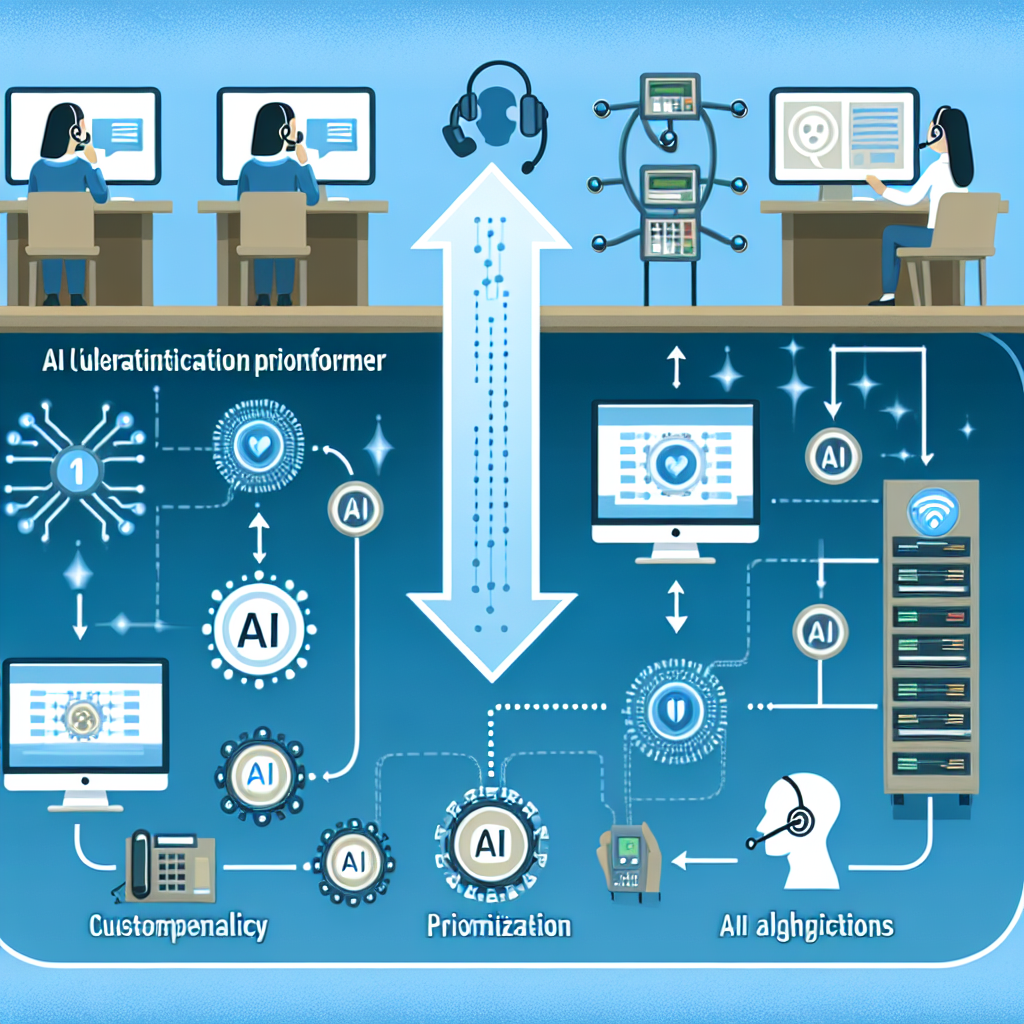
In the highly competitive realm of customer service, innovations continue to emerge at a rapid rate. Advances in Artificial Intelligence (AI) have paved the way for sophisticated systems such as Intelligent Call Prioritization (ICP), a concept that's revolutionizing how businesses handle incoming calls. Its implementation is particularly crucial during service outages or crises when the sheer volume of calls can potentially be overwhelming.

Intelligent Call Prioritization employs AI to sort through incoming calls, distinctly identifying, categorizing, and prioritizing them based on urgency and context. This system serves as a digital gatekeeper, ensuring that crucial calls from, say, distraught customers facing severe service disruptions, are attended to instantly, before less urgent queries. An in-depth study reveals how this can hugely enhance customer service experience and mitigate business risks.
This technology, while prevalent in customer service sectors, is arguably most essential during service outages or emergencies when efficient communication is paramount. In such situations, the ability of Intelligent Call Prioritization to detect urgency through speech recognition and immediate categorization dramatically reduces response time and aggravation. Enterprises that can leverage this technology are placed ahead in crisis management, affirming the worth of their investment in AI.
In conclusion, Intelligent Call Prioritization is an exemplary testament to the strength of AI in enhancing customer service. Its pivotal role during service outages or crises is increasingly being recognized, earning it a key place in the toolkits of forward-thinking organizations across the world.
During times of service outages or crises, the importance of maintaining reliable communication is critical. For businesses and service providers,being able to handle large volumes of customer inquiries is a pressing challenge. This is where the role of artificial intelligence (AI) comes into the forefront. AI enables the integration of advanced technology like Intelligent Call Prioritization systems which can manage and streamline the surges in call volumes without compromising on the quality of service or response times.
The key feature of AI in these circumstances is its ability to understand, learn, and predict call patterns during peak times. Capable of analyzing large datasets swiftly, AI can help determine which calls necessitate immediate attention based on their urgency indicated by a variety of factors, such as keywords or tone of the user's voice. This is achieved through natural language processing abilities of AI, allowing systems to analyze and prioritize calls effectively.
By routing critical calls to the appropriate personnel swiftly, Intelligent Call Prioritization ensures no crucial communication is misplaced or forgotten during these periods of heightened demand. It ensures the quality of customer service is maintained at a high level without overburdening the workforce, further solidifying the essential role of AI technology in today's digital society.
Moreover, AI systems can also monitor and keep track of the overall call patterns and trends, thus providing valuable insights for future crisis management strategies. Combining the power of predictive analytics, businesses can anticipate future requirements during crises and manage resources accordingly, showcasing the versatility of AI in managing service outages or crises. This proactive approach to managing these events not only ensures smoother operations but also enhances customer satisfaction and trust.
In conclusion, the integration of AI, and specifically Intelligent Call Prioritization systems, has drastically evolved the sphere of customer service during service outages or crises. By efficiently handling high call volumes and maintaining the quality of interaction, AI continues to prove itself as an indispensable asset in modern customer service solutions.
As service disruptions become increasingly likely in an infrastructure-plagued world, intelligent call prioritization becomes imperative for maintaining an unruffled customer experience. Artificial Intelligence (AI) enabled call prioritization is a smart solution that integrates seamlessly with your existing call center management and customer service systems, with minimum modifications, and without the need for extensive system overhauls.
In other words, your current telephony system can remain largely unaltered while gaining the ability to prioritize calls based on their importance. This provides more efficiency during service outages or crises situations, ensuring that high-priority issues don't get lost in the clutter of high call volumes. The right customers get the help they need, when they need it, bolstering your company's reputation and customer satisfaction. You can see an illustrative example of how this works by searching AI call prioritization demo.

Even better, the implementation of an AI call prioritization system can often be carried out remotely, which is a distinct advantage in periods of unanticipated disruptions, when IT specialists may not be readily available on-site.
At the heart of this technology is the ability to leverage current customer information extracted from multiple channels of communication within the company’s CRM (Customer Relationship Management) systems. Building on this data, AI algorithms can assess the urgency and importance of each incoming call, enabling speedy resolution for significant issues.
Another interesting feature of this technology is its ability to learn and adapt over time. By utilizing machine learning techniques, these systems gain the ability to fine-tune their operation based on the company's unique and evolving needs.
Overall, the integration of AI call prioritization technology with existing systems not only optimizes call handling during service outages or crises but also magnifies the effectiveness of customer service representatives by steering vital calls their way. It’s a win-win move for consumers and businesses alike.
In conclusion, AI call prioritization is a vital tool for any modern call center looking to maintain high levels of service in the event of unexpected outages or crises. By leveraging current CRM data and machine learning techniques, these systems provide a tailored approach to customer service that is sure to please businesses and consumers alike.
Intelligent call prioritization has played a pivotal role during service disruptions and emergency situations in a variety of industries. AI-enabled prioritization systems ensure that crucial messages and calls reach the top of the queue, fostering efficient communication and fast response times.
One powerful example of this can be found in the healthcare industry. Consider the COVID-19 health crisis, which saw an unprecedented upsurge in digital healthcare and telemedicine. Ohio-based call center solutions provider, Ambs Call Center, implemented an AI-based call triage system. This technology prioritized calls based on patient need level, thereby ensuring that severely affected patients could contact healthcare professionals promptly.
Similarly, innovation has been key in the telecommunications industry. During Hurricane Sandy, Verizon Wireless utilized a smart network routing system that allowed the company to manage an inundation of service requests. Through intelligent prioritization, the system ensured that emergency services and vital calls were prioritized, while less urgent data transfers were handled efficiently.
Another case study can be found in the energy industry. Power outages often lead to a surge in customer calls and complaints. To tackle this, EmNet, a South African energy provider, has successfully implemented a machine learning-based call prioritization tool. This tool recognizes outage patterns and prioritizes calls based on their estimated level of urgency. The implementation of this tool has reportedly increased the speed of their customer service response during crises.
What these case studies demonstrate is the transformative power of intelligent call prioritization during periods of high demand and in crisis situations. These proactive, AI-driven systems ensure that crucial calls and service requests are dealt with promptly and efficiently, enabling organisations to deliver better service even under challenging conditions.
As the global emphasis on disaster prevention and management increases, the practical implementation of AI-powered solutions continues to evolve. Artificial intelligence is poised to revolutionize the way organizations process and prioritize communications during unprecedented events. The future trends demonstrate a clearer, more efficient path when dealing with service outages or crises through Intelligent Call Prioritization.

One notable advancement is the growth of Natural Language Processing (NLP), and its potential to radically improve the interpretation of inbound crisis communications. This AI technology can analyze the keywords and sentiments within a flood of communications, swiftly pinpointing priority issues. By identifying patterns in the linguistic data, this technology will enable businesses to address critical emergencies promptly.
Furthermore, Machine Learning (ML) algorithms can improve crisis responses by learning from the past. ML can foresee likely scenarios based on historical patterns and help plan strategies for mitigation. This kind of predictive intelligence could dramatically reduce response times during a crisis.
Additionally, AI neural network platforms are emerging that simulate human decision-making processes to prioritize tasks during a crisis. These platforms can analyze extensive data quickly and accurately, allocating tasks based on urgency and resources. The outcomes provide organizations with a roadmap for the fastest, most effective resolutions.
In conclusion, the integration of AI in crisis management promises a future where organizations are better equipped to handle emergencies and service disruptions. Merging human ingenuity with AI's predictive analysis and natural language processing will assist in managing precarious situations with improved urgency and precision.
In an era marked by rapid technological advances and escalating customer demands, the necessity for Artificial Intelligence (AI) integration in call centers during emergencies is indisputable. In unforeseen moments of service outages or crises, Intelligent Call Prioritization (ICP) systems prove to be a lifeline for companies, ensuring customer concerns are addressed promptly and efficiently.
In the ignominious chaos that often accompanies a crisis, ICP can streamline communication, automatically filtering and prioritizing calls based on their severity and relevance. The intelligent system cleverly separates the wheat from the chaff, allowing call center teams to focus their resources on resolving pressing issues, thereby remarkably pestering clients’ wait times. Implementing ICP ultimately serves to bolster customer trust and satisfaction - vital aspects to business success.
As businesses consider adopting AI and ICP, there are some actionable recommendations to bear in mind. Firstly, choose a reliable service provider with a history of successful AI integrations in crisis scenarios. Various providers offer these services, and selecting a capable partner is crucial to reaping the full benefits of this technology. Secondly, ensure the chosen system can integrate seamlessly with existing infrastructure without causing significant disruption.
Thirdly, businesses must put in place robust systems to monitor and analyze the AI system's effectiveness. Regular checks ensure that the system is working optimally and helps identify areas that need improvement, thereby ensuring a successful AI integration.
In conclusion, the convergence of AI and call centers fuels the transformation of crisis management, providing an unparalleled ability to predicate, streamline, and handle customer interactions. As AI matures and call centers worldwide adopt more sophisticated models, organizations must rise to the occasion, seize this opportunity, and transform potential crisis scenarios into opportunities for lasting customer relations.
Start your free trial for My AI Front Desk today, it takes minutes to setup!








